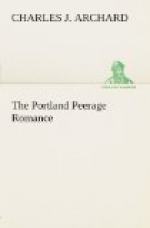He was a dandy rivalling d’Orsay, his cravats made other young men of his time envious, and his suits were in the highest style of taste. They were indeed works of art worthy of the genius of Beau Brummell. As for the House of Commons, until he turned serious politician, he treated that old-fashioned assembly with haughty indifference, and when he was pressed to record his vote in party division he entered the House on more than one occasion at a late hour, “clad in a white great-coat, which softened, but did not conceal, the scarlet hunting coat beneath it.”
He was a breeder and backer of horses for twenty years, and the recklessness of his wagers staggered the gamblers of his time.
The training of race-horses was brought to a fine art in his day. It had been the custom for owners to send their horses to and fro between Newmarket, Epsom and Doncaster along the high-ways, with the result that although the road hardened their muscles, it militated against their speed.
Lord George raised a protest from some of the old-time patrons of the turf by introducing an innovation in the construction of a large van in which they could travel calmly, without fatigue, these long distances to various parts of England.
It was the precursor of railway travelling then coming into vogue, for Lord George foresaw that the railways would revolutionize racing and enormously increase the votaries of the turf.
After having sat in the House of Commons for 18 years, and taking little interest in the proceedings, Lord George, about 1844, suddenly attracted attention by his attacks on Sir Robert Peel and the Free Traders. He showed an aptitude for Parliamentary business that he had not been credited with in racing circles in which he had held such a leading position. His absorption in politics, which had newly aroused his interest, led him to dispose of his race-horses.
“In the autumn of this year (1846) at Goodwood races,” says Disraeli, “the sporting world was astonished by hearing that Lord George Bentinck had parted with his racing stud at an almost nominal price. Lord George was present, as was his custom, at this meeting held in the demesne of one who was among his dearest friends. Lord George was not only present, but apparently absorbed in the sport, and his horses were very successful. The world has hardly done justice to the great sacrifice which he made on this occasion to a high sense of duty. He not only parted with the finest racing stud in England, but he parted with it at a moment when its prospects were never so brilliant; and he knew this well.




